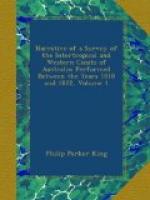The boat returned at ten o’clock while we were getting underweigh; but the wind being at South-East it was one o’clock before we weathered Point Cunningham, when the tide was urging us forward rapidly. In steering round the point we found ourselves passing through some light coloured water and, before we could extricate the brig, were in three and a half fathoms; the anchor was immediately dropped underfoot and, with the assistance of the sails, which were kept full, the vessel was retained whilst the whale-boat was veered astern, and ascertained that the shoalest part had been already passed; therefore the anchor was again weighed, and eventually dropped in the bay to the south of Point Cunningham in fourteen fathoms and three quarters, fine speckled sand and stones.
In the direction of North 63 degrees West and at a mile and a half from the anchorage was a remarkable flat-topped hill which was called at Mr. Cunningham’s wish, Carlisle Head, and the bay in which we anchored, Goodenough Bay, in compliment to the Right Reverend the Lord Bishop of Carlisle. At this part Mr. Cunningham found a new species of velleia (of the natural order Goodenoviae).
We were now suffering much from the extreme heat and closeness of the weather; the thermometer ranged night and day between 85 and 89 degrees, and when the breeze was light or the weather calm the air was insufferably hot and close, and affected us all very much, but happily without any very serious consequences.
In the evening four natives armed with spears were seen sitting in the shade upon the sandy beach under Carlisle Head, attentively watching us; but upon being joined by three others, who came towards them from Point Cunningham, got up and walked away. We have yet to learn how far these people may be confided in, for we were not at a very great distance from Hanover Bay where we so nearly paid dear for trusting ourselves amongst them unarmed.
February 13.
We remained at the anchorage in Goodenough Bay until the following morning, when we weighed to a very light breeze from south-east, the only direction from which we experienced any wind; the breeze generally blew strong at night, whilst during the day it was light, or nearly calm; so that during the night we were very insecurely placed if the anchorage was at all suspicious, and in the day were either delayed very much or entirely prevented from weighing.
Thus it was with us on this day; soon after we weighed it fell calm and the tide, drifting us rapidly to the southward over rocky ground, carried us close to a reef of dry rocks to the northward of Foul Point without our being able to avoid it. At a little before five o’clock the flood-tide was nearly expended and obliged us to drop the chain-cabled anchor at the distance of three miles from Foul Point, upon a bottom of rotten yellow-coloured rock that crumbled away upon being touched, but from the noise that the chain made in dragging over the ground there was reason to apprehend it was very rocky; and consequently great fears were entertained for the safety of our anchor.




